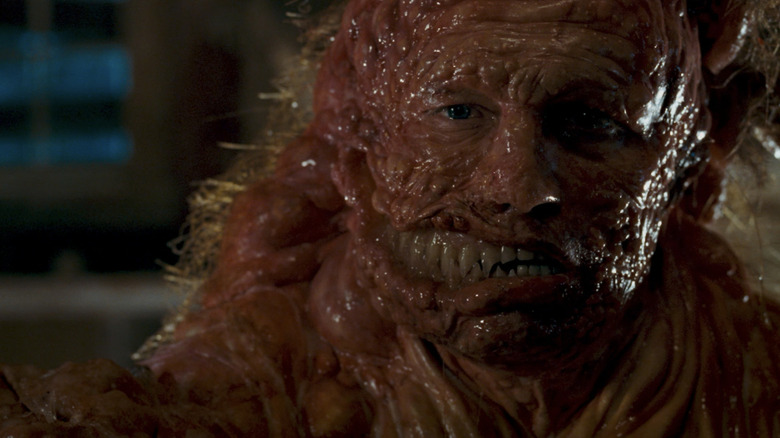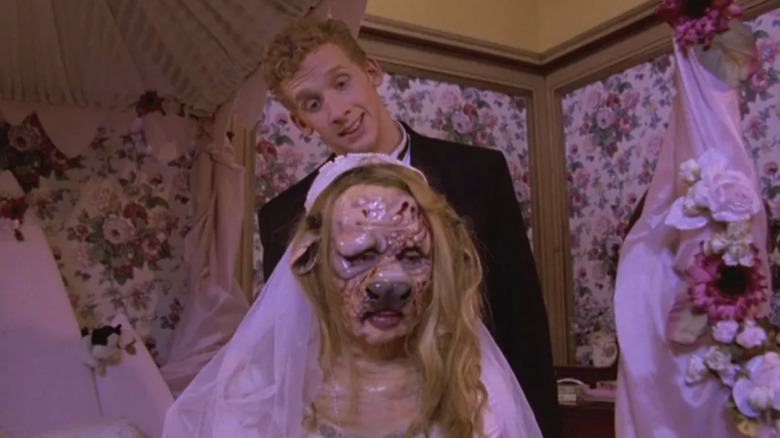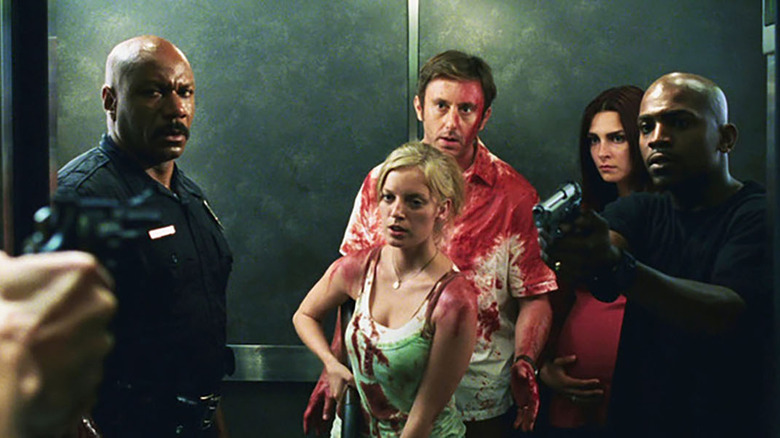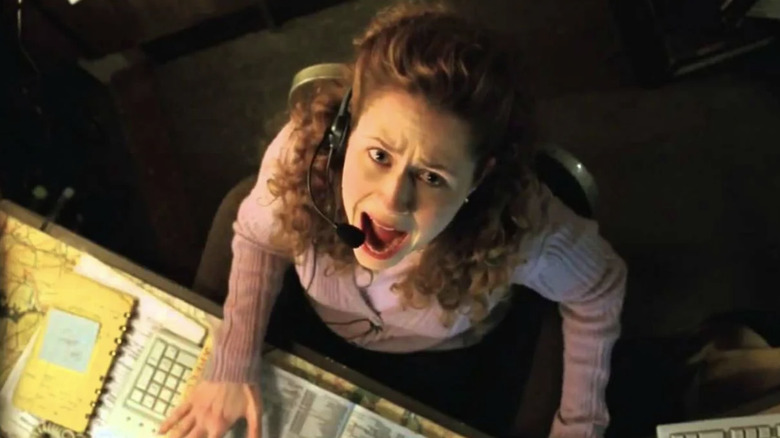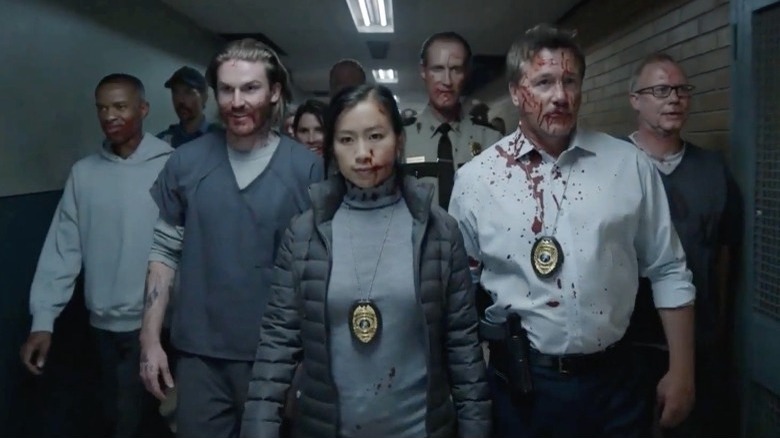Slither And How James Gunn's Horror Roots Led To Marvel
For some people, James Gunn is best known for his work in both the Marvel Cinematic Universe and the DC movie universe. The director of the "Guardians of the Galaxy" trilogy, "The Suicide Squad," and the "Peacemaker" series, Gunn has set his work apart from most comic book movies of recent years by injecting irreverent comedy, dynamic music, and an energy that prioritizes fun above all else into what could've been paint-by-numbers stories. While "Guardians" helped make him a household name in 2014, Gunn had already generated a die-hard fandom thanks to his work in the horror sphere. A die-hard horror fan from his earliest years, Gunn grew up reading Fangoria magazine, attending midnight movie screenings, and making 8mm zombie films with his brothers.
Horror has been the lifeblood of his love of cinema, and these influences are proudly on display, even in his mainstream superhero blockbuster projects. While the film industry as a whole tends to view horror as a lesser-than genre, Gunn's background in horror films has only been to the benefit of his big-budget Hollywood pictures. With "Guardians of the Galaxy Vol. 3" heading our way in 2023, there's no better time to assess and celebrate James Gunn's journey from low-budget horror to directing some of the biggest movies in the world.
Welcome to Tromaville
Known for its over-the-top schlock, gore, and farce, Gunn found his time working at the micro-budget film production company Troma Entertainment to be far more worthwhile than earning an MFA from Columbia University. While making $400 a week, Gunn was given an on-hands crash course on the practicality of filmmaking. Gunn may have written the script for the trashy horror comedy "Tromeo and Juliet," but Gunn says working on that film taught him how to write screenplays, produce films, scout locations, direct actors, distribute films, and create his own poster art. Troma does absolutely every aspect of filmmaking in-house, which allowed Gunn a full circle look at the industry as a whole. Gunn has called Troma founder Lloyd Kaufman his mentor, and has cited Kaufman as pivotal to his success. "I learned to try to make a movie for free, and you'll end up spending the bare minimum of what you can spend," he said.
Troma was a crash course in everything about making movies, from writing a script to casting to location scouting to production to marketing the film. Without @lloydkaufman I certainly wouldn’t have the all-around education I needed to be a film director. pic.twitter.com/tKECJZUeY8
— James Gunn (@JamesGunn) December 30, 2020
Troma films are known for their shoe-string budgets, scraping together horror, sci-fi, and gross-out comedy films as a genuine labor of love. Over the studio's over 45-year history, Troma has produced, acquired, and distributed over 1,000 independent films, even helping launch the careers of creatives like "South Park" creators Trey Parker and Matt Stone. Gunn later co-authored the book "All I Need To Know About FILMMAKING I Learned From THE TOXIC AVENGER: The Shocking True Story of Troma Studios" with Kaufman, explaining how the best possible film school is getting a group of people together, and making the damn movie.
Scares and screenplays
For his first Hollywood screenplay, Gunn penned the script for the live-action "Scooby-Doo" movie. Clearly still feeling the effects of his years at Troma, the original cut of the film would have earned an R-rating. There's obviously no way Warner Bros. and Hanna-Barbera would have let their golden goose leave the family-friendly confines, and Gunn was challenged to restructure the film for all ages. While Gunn personally believes "Scooby-Doo" should have continued with the intended plan to make a raunchy teen comedy, the film's retooling may have been the best possible exercise to prepare him for his eventual superhero work. It taught him just how far he could push comedy and scares while still appeasing the MPA, and the film was a massive success. Gunn was approached to write a variety of Hanna-Barbera films in the wake of "Scooby-Doo" but instead set his sights on the "Dawn of the Dead" remake with director Zack Snyder.
Horror fans expected "Dawn of the Dead" to fail, as remakes are usually not well received. However, Gunn and Snyder did the impossible, and "Dawn of the Dead" surpassed all expectations. Knowing it would be a fool's errand to try and remake the film beat by beat, Gunn instead provided a story that featured the most memorable moments and lines of the original, but still felt wholly original and updated for modern audiences. This is the film of someone who not only loves the source material, but respects it. This mindset would prove beneficial later in his career as he adapted well-loved comic books.
Slither: a love story
In his directorial debut, Gunn combined everything he'd learned working in both the low-budget world of Troma and Hollywood studio system, and created the '80s-inspired creature feature, "Slither." A marriage of films like "Night of the Creeps," "Shivers," "The Brood" and the Junji Ito manga "Uzumaki," Gunn made the most of his $15 million budget, and delivered an independent horror film boasting some of the best practical effects in years. "I learned to fight for what I believed in," said Gunn. Universal originally wasn't going to spend the money to screen the film for critics, but Gunn felt that it was necessary and convinced the studio otherwise. The film ended up being one of the best-reviewed horror movies in years ... even if the crowds didn't turn out for it. "The truth is that 'Slither' was not financially successful, so the fact that it was so well-reviewed really helped my career," Gunn said. "There are times in life when I just have to follow this instinct, no matter how uncomfortable it is."
"Slither" is an amalgamation of everything that makes James Gunn great. It's hilarious, creepy, filled with practical effects, impressively graphic, features a killer soundtrack, boasts an incredible performance from Michael Rooker, and has an unexpected heart that sneaks up on the viewer with the same tension as a jump scare. "Slither" is a love letter to the B-movie horror and sci-fi films that helped formulate Gunn's love of cinema, and evidence that James Gunn was the future.
How Gunn injected horror into comic book movies
When Gunn was announced as the writer/director of "Guardians of the Galaxy," genre fans couldn't have been more thrilled. Marvel was already nine films deep into "The Infinity Saga" when "Guardians" debuted, and it was clear that Gunn was on an entirely different wavelength than what came before. Gunn's sense of humor was a bit edgier than what was seen in films like "Iron Man," "Thor," and "Captain America," and his lovable group of misfits felt a lot like the teams Gunn brought to life in "Scooby-Doo" and "Dawn of the Dead." Gunn effortlessly weaved in over-the-top violence with hilarity and heart like he had done with "Slither," and despite the commercial failure of his black comedy film "Super," Gunn was able to show that he knew a thing or two about comic book movies. "Guardians" ushered in a new form of maturity to the MCU, with sensibilities clearly inspired by his previous work.
He took things to the next level with "The Suicide Squad," which, until "Peacemaker," felt like the most James Gunn project to ever James Gunn. As /Film's own Danielle Ryan described the film, "Both feature unlikely heroes, unconventional love stories, mind-controlling alien hordes, and more guts and gore than you could shake a stick at." They continued by saying, "Both are stories about how we treat each other, and how our assumptions about one another can hurt us more than even invading aliens."
By bringing the metaphors hidden beneath the gore and spectacle of a horror film to a superhero franchise, Gunn proves why there's always been deeper themes in comic book movies worth exploring, and that you can never go wrong with an extra bucket of blood.
